
by Michael Young — thenationalnews.com — There has been much speculation lately about whether Lebanon will go ahead with its parliamentary elections, scheduled for May. While most of the country’s major parties may have an interest in postponing the vote, the obstacles to this are very significant, suggesting that there is a better than even chance that elections will be held. Certainly, parties such as Hezbollah and its electoral allies, the Amal Movement of Parliament Speaker Nabih Berri and the Free Patriotic Movement of President Michel Aoun and his son in law Gebran Bassil, might favour a delay. Amal and especially the FPM are expected to lose some seats, and therefore prefer to retain their present share in Parliament. As for Hezbollah, it controls, with its various allies, a parliamentary majority, and has no enthusiasm to see this eroded. There are several problems with this, however. The first is that an election can only be postponed if Parliament extends its constitutional term, requiring a two-thirds majority vote. Mr Berri can probably find the numbers, but that’s unlikely to be enough, as he will also be seeking broad sectarian support as well, in order to lend national legitimacy to what is bound to be a controversial decision.
The big question mark is how the main Sunni bloc, controlled by former prime minister Saad Hariri, will vote. Mr Hariri withdrew from politics in January, in a decision widely believed in Lebanon to have been encouraged by Saudi Arabia. If he were to order his bloc to vote for extending Parliament’s term, this could be seen as a surreptitious way of trying to remain active politically, which he doubtless does not want to do. While most of the country’s major parties may have an interest in postponing the vote, the obstacles to this are very significant
The Lebanese Forces party, an important Christian party that is seen as close to Saudi Arabia, is profoundly hostile to any extension, believing it can take many seats from the FPM. That makes the Hariri bloc’s vote in favour of an extension even more unlikely. At the same time, the former prime minister does not want to face European anger. European diplomats in Beirut warn that some EU countries may sanction parliamentarians who vote for an extension. So, if the principal Sunni bloc and the Lebanese Forces refuse to go along with Mr Berri, this would undermine the consensus needed to make an extension acceptable nationally. And yet without guarantees of an extension, Hezbollah and Amal would have no choice but to move towards elections, to avoid a vacuum in the major state institution led by someone from their Shiite community.
The second problem is more complicated. In Lebanon, Parliament elects the president, and later this year Mr Aoun’s term will come to an end. His ambition is to see Mr Bassil succeed him. However, there are a host of problems with this scenario. First, Mr Berri is strongly opposed to it. Second, Mr Bassil is under US sanctions. And third, it’s unclear whether Hezbollah even backs a Bassil presidency today. Were Mr Berri to begin a process of extending Parliament’s term, it is highly likely that Mr Aoun and Mr Bassil would condition their approval on a package deal that swaps FPM support for a commitment from Hezbollah and Amal to back a Bassil presidency. This would force Hezbollah’s hand at a time when it probably does not want to reveal its cards. It could also embarrass the party if no agreement is reached, by showing that it is the Shiite parties that are denying Lebanese voters a chance to vote.
Then there is international pressure. The US and European countries have regarded the elections as an important step that will allow the Lebanese to replace their corrupt leadership with more credible figures. While few expect a major earthquake, any extension would be regarded by Washington and the EU as a cynical manoeuvre by the political class to preserve its power by avoiding electoral accountability. This may have repercussions for Lebanon’s negotiations with the International Monetary Fund. While the IMF won’t involve itself in internal Lebanese politics, for the political leadership to perpetuate itself by postponing an election would only show the institution that there is no interest in reform and renewal in the country. That could well impact how the IMF deals with the Lebanese authorities down the road.
The electoral outcome is difficult to predict. Much will depend on the participation level, since the lower the participation, the lower will be the threshold for independents and civil society figures to enter parliament. In that case, there could be surprises. This could be all the truer as so many people have no good reason to vote for their traditional sectarian leaders or parties, who have done almost nothing in two years to take Lebanon out of its dire economic situation, one of the worst on record. But no one really expects the elections to radically redraw the Lebanese political landscape. Sectarian leaders remain strong, while Hezbollah dispenses considerable patronage, a situation that may improve if there is a windfall of Iranian revenues thanks to the nuclear deal currently being negotiated in Vienna. The party’s best option, then, may be to allow elections to go ahead, and deal with the aftermath as best it can. Published: March 01, 2022, 8:00 AM



